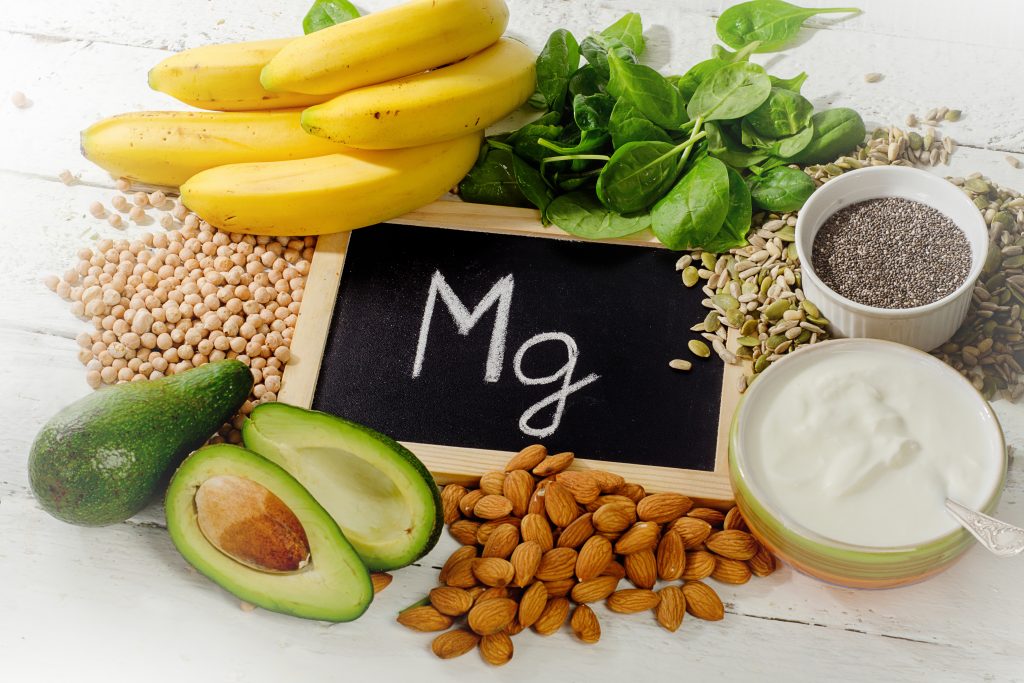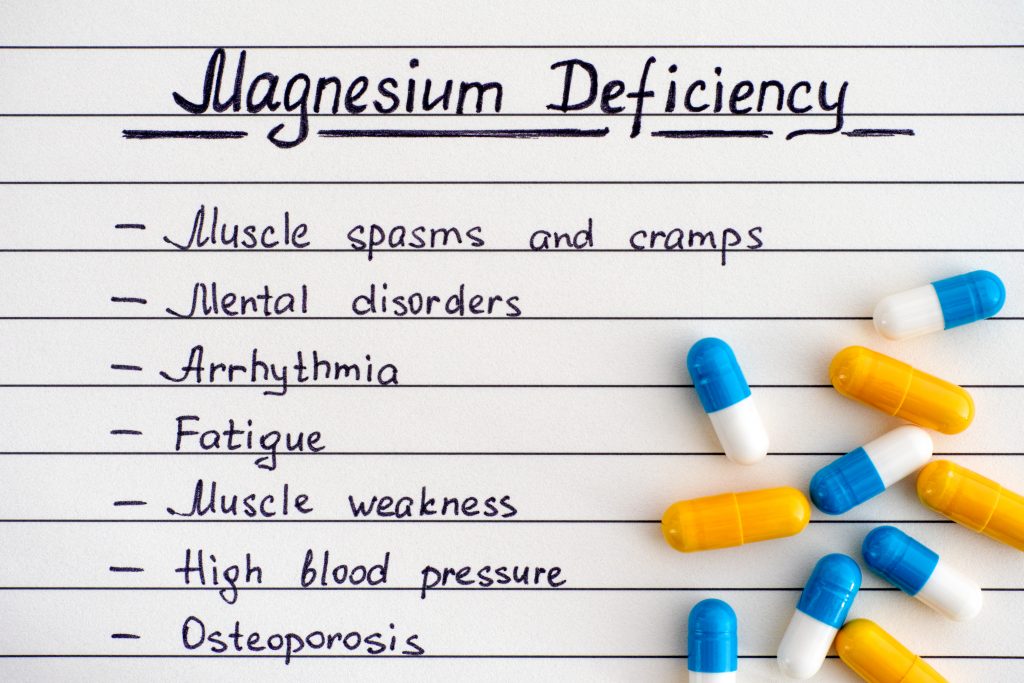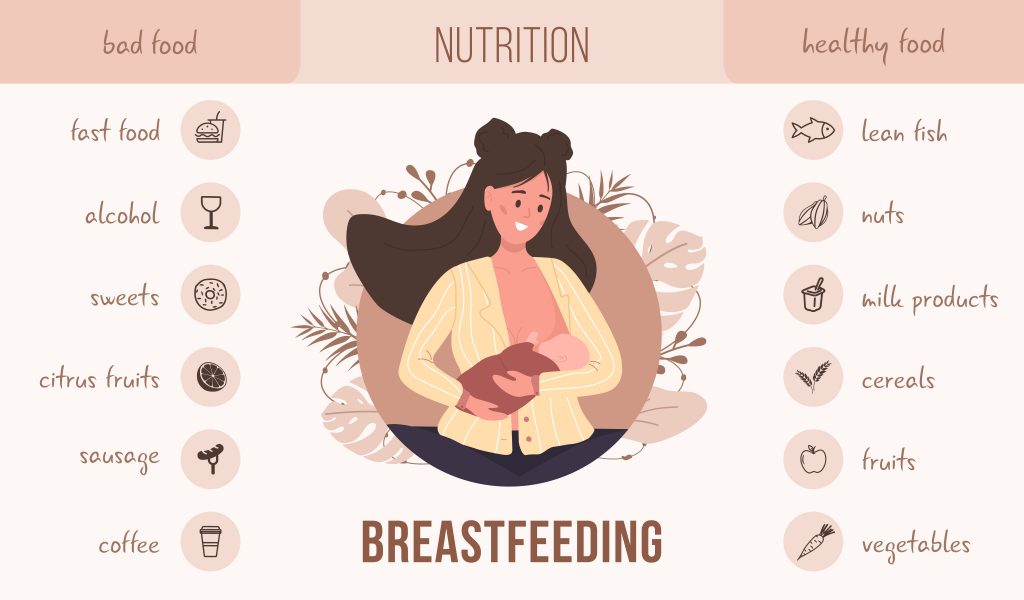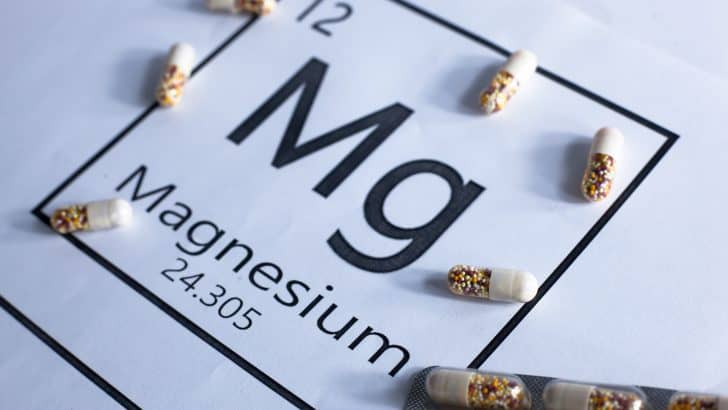If you’re thinking about taking magnesium while breastfeeding, I suggest you read this article with valuable information.
As a new, breastfeeding mom, you’re probably wondering what is safe to consume. There are many foods and drinks that are filled with bad ingredients, and you don’t want to give those to your child.
Your breast milk is the elixir of life for your little one. Everything you put inside your body will also go into your baby’s body. In the past, people weren’t so obsessed with ingredients. However, since the food is becoming more toxic each day, you have to take care of your diet.
Wrong foods and drinks can make you feel unwell while breastfeeding. It can also create problems with your baby’s health. Some foods can cause colic, allergies, stomach pain, or digestive problems.
Also, food that is not of good quality will make you feel weak and slow while breastfeeding. So, you should take care of everything you use and consume. Supplements are great, but before informing yourself about them, don’t take them. They are helpful, but sometimes they’re not needed. Sometimes, supplements can cause damage to your body and that’s why you should be careful about using this without doing your research first.
Let’s try to give the best answer to a question – Can I Take Magnesium While Breastfeeding?
What Is Magnesium?

Magnesium is a mineral that is responsible for many functions in our body. This mineral is important for your bones, heart, blood pressure, muscles, energy, sleep, and much more.
Many people are suffering from magnesium deficiency, but unfortunately, they don’t recognize the symptoms. Tiredness, insomnia, muscle and leg cramps, low energy, constipation, and headaches are just some of the symptoms.
Of course, there are some serious conditions caused by magnesium deficiency. Some of them are depression, psychosis, hypocalcemia, vertigo, hypertension… The daily requirement for magnesium is around 300mg for women and around 400mg for men.
Nowadays, there are tests that can show if there is a mineral or a vitamin deficiency, so don’t jump to conclusions on your own. You could start taking a magnesium supplement and see how it goes, but if you feel some side effects, stop with the consumption.
The reason why so many people have magnesium deficiency lies in their diet. Unfortunately, food is filled with artificial ingredients, and not so many people choose to eat healthier. Magnesium can be found in leafy vegetables like spinach, nuts, fruits, and beans.
So, someone who is eating healthy should not have a problem with this condition. Taking breastfeeding safe magnesium supplements is also a great way to avoid and prevent health problems, but consulting a doctor is a must. Too much magnesium can cause some health issues.
I would like to add that some people have magnesium deficiency because of a certain medical condition or illness. Any kind of symptoms should be investigated thoroughly.
Usually, magnesium is taken in the form of magnesium citrate. Magnesium citrate is a mix of magnesium and citric acid. It is also known as a magnesium preparation in salt.
Magnesium citrate is used as a magnesium supplement and as a cure for constipation since it has laxative effects. Breastfeeding women can take magnesium citrate as long as they follow the instructions. Safe breastfeeding is always a priority.
Forms Of Magnesium
When looking at nutritional value and ingredients, there are different types of magnesium. Magnesium citrate is commonly used, but there are also magnesium glycinate and lactate.
There are some other forms, but these are the most important ones. Magnesium glycinate is famous for having little to no side effects, and magnesium lactate is easily absorbed by your digestive system.
You will also encounter magnesium oxide, magnesium malate, magnesium sulfate, and magnesium chloride. Magnesium can be found in the form of pill, capsule, body oil and lotion, spray…
Should You Take Magnesium While Breastfeeding?

It’s not hard to guess that magnesium is an important mineral and that it has a significant role in our bodies. Since it’s suggested to be careful when taking magnesium, you should be even more careful if you’re a breastfeeding mom.
Taking magnesium while breastfeeding is allowed. No evidence says it’s harmful to you, your milk supply, or the baby. It’s suggested to take magnesium while breastfeeding since it’s an essential mineral.
Calcium is a mineral that’s important for breast milk. Low calcium means problems with breastfeeding. However, low magnesium can also lead to low calcium resulting in decreased lactation and milk supply.
If you’re a breastfeeding mom, your daily requirements for magnesium are around 400-450mg. You’re the source of food for your baby, and that’s why you need to take more nutrients, minerals, and vitamins in general.
Another important thing about taking magnesium while breastfeeding is its effect on your energy levels and mental health. Magnesium helps with many key body functions. If you’re taking enough magnesium, you shouldn’t worry about feeling too tired or exhausted.
If you do notice some unusual symptoms, remind yourself about magnesium deficiency and ask around for magnesium supplements. As a new mom, reaching your daily requirements for nutrients can be hard. High-quality food is packed with essential minerals, but sometimes you don’t have the time to prepare it and eat it.
In that case, don’t be afraid to ask for help from your loved ones. Ask them to give you a hand in the kitchen. Don’t neglect yourself and your health. Proper nutrition is important not just for you, but for your baby too.
Taking supplements is desirable to avoid any kind of medical conditions or complications. Also, recognizing the symptoms on time is a great way to prevent further complications.
If you’re using baby formula instead of breastfeeding, find a good one. Many formulas have a lot of calcium, but the amount of magnesium is on the lower side. Also, high calcium formulas can be the cause of SIDS (sudden infant death syndrome). Because of this, find a formula that has a perfect amount and a good ratio of calcium and magnesium.
Benefits of Magnesium

Magnesium is an essential mineral that is responsible for many functions. It prevents many conditions and diseases such as depression, hypertension, migraines, diabetes, and cardiovascular problems.
Because of this, you should take enough magnesium while breastfeeding and during pregnancy. You will be healthier, your milk supply will be better, your baby will get the nutrients she or he needs, and you will feel better.
Pregnancy and breastfeeding can drain you, and it can be hard to be active. That’s why it’s important to follow yourself and listen to your body. Don’t be afraid to ask for medical help and attention.
Magnesium will make a difference for you. If you’re someone who never took care of minerals, you will probably feel refreshed and rejuvenated after taking magnesium. Your energy levels will be higher, you will feel stronger, and more motivated.
Because of this, taking magnesium as a supplement while breastfeeding is encouraged. It is recommended to meet your daily requirements for this mineral by eating right.
It’s always better to get what your body needs through eating and drinking healthily. Just like everything else, a natural approach is always better.
So, before searching for a perfect magnesium supplement, try to improve your diet. Try to implement the foods that are high in magnesium. Breastfeeding mothers could avoid postpartum depression by taking enough
Magnesium Rich Foods

Dark Chocolate
Dark chocolate with a high percentage of cocoa is great for your health. It has a lot of minerals, vitamins, and antioxidants. High levels of magnesium and fiber in dark chocolate will improve your performance and health.
Nuts
Nuts are a great source of healthy fats, protein, vitamins, fiber, and minerals. Additionally, nuts are very filling and they taste great. If you want to take some magnesium while breastfeeding, eat some nuts. They are easy to consume and most of them don’t require a lot of preparation or cleaning. They are perfect for a busy mom.
Beans
All kinds of beans are packed with protein, fiber, and minerals. Magnesium levels can be increased with the regular consumption of beans.
Seeds
Seeds will definitely increase your magnesium levels. For example, pumpkin seeds and chia seeds can be found everywhere and they are easily added to your everyday meals. Besides, they taste good and have a lot of health benefits.
Avocados
Avocado is amazing because it can be consumed in so many ways and it is delicious. It’s rich in protein, healthy fats, and magnesium. You can eat avocados for breakfast, desserts, or in the form of sauce. The choice is yours.
Bananas
Bananas are super filling and they are rich in magnesium. They are easy to grab and eat which makes it easier to incorporate them into your meals. Bananas have a bit more calories than other fruits, so be careful how many bananas you’re eating.
Fish
Fish that has a lot of healthy fats and it will also help with your magnesium level. Fish is a light meal that provides many nutrients, healthy fats, and protein. Preparing fish can be challenging for the first time, but once you get a hang of it, it will be super easy.
Leafy Greens
Spinach, kale, or collards have a lot of magnesium. They are a great addition to your meal since they don’t take a lot of time to cook and can be consumed fresh. You can also leafy greens to your protein shakes or smoothies.
Milk
Milk has a lot of calcium and magnesium. Drinking a few glasses of milk can help you a lot with your magnesium levels. I would like to mention that plant-based milk such as soy milk or almond milk is also good for magnesium. So, even if you’re lactose intolerant, a dairy-free option will work.
Important Minerals

Magnesium is one of the most important minerals, but there are others too. Some of them are calcium, phosphorus, sodium, potassium, iron, copper, and zinc.
Most of these minerals can be taken from the food. However, many people need more calcium, magnesium, and potassium in their diet. That’s why mineral supplements are so popular.
Calcium can be found in milk, yogurt, cheese, salmon, tofu, leafy greens… It’s essential for strong bones and good teeth. It’s even more important for children since their bodies are still developing.
Iron is very important and enough red meat, soybeans, turkey, and pumpkin seeds will help with your iron intake. When it comes to iron, vitamin C is important to absorb it.
Potassium can be found in potatoes, tomatoes, bananas, and spinach. Potassium is significant for your nerves and blood pressure. Zinc is important for your mental functions, memory, and hormonal production. Another great benefit of zinc is great skin, hair, and nails.
These important minerals are essential for your good health and looks. As a new mother, you need to take care of your mineral levels. Your only priority should be keeping yourself and your baby healthy. There is plenty of information that can help you with managing a good diet and a healthy lifestyle.
Conclusion

Nursing mothers should take care of their magnesium needs and magnesium intake. Daily magnesium intake is not just important for new mothers. It is also important for babies, especially breastfed infants.
By taking enough magnesium while breastfeeding, you can avoid muscle cramps, tiredness, and a low milk supply. As you can see, researching about this for an educational purpose will bring you many benefits.
As always, consulting your doctor before taking any additional vitamins, minerals, and supplements is a great idea to avoid some unwanted side effects. You may be experiencing some symptoms that indicate magnesium deficiency, but you think they’re connected to all the changes you’ve been through.
Magnesium deficiency can be solved, but be careful if you have it. As I’ve said before, these symptoms can often be a consequence of something more serious. Therefore, you must acknowledge what your body is telling you. Don’t ignore the symptoms and don’t take your health for granted.

Hi all, I am Sidney, an accountant, a hobbyist photographer, and a mother to two sweet girls who are my motivation. I love sharing the tips and tricks I gained all these years I’ve been a mother. I hope it will help you!


Body Armor While Breastfeeding • Mama Bean Parenting
Friday 3rd of March 2023
[…] Magnesium while breastfeeding is something many moms swear by. […]